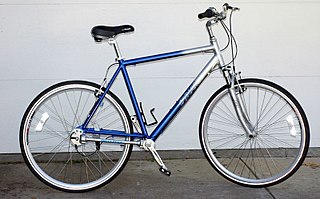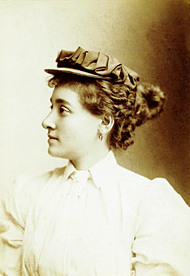| Industry | Manufacturing |
|---|---|
| Headquarters | United States |
| Products | Bicycles |


Sterling Bicycle Co. (also known as Sterling Cycle Works) was a 19th-century American bicycle company first based in Chicago, Illinois before relocating to Kenosha, Wisconsin.
| Industry | Manufacturing |
|---|---|
| Headquarters | United States |
| Products | Bicycles |


Sterling Bicycle Co. (also known as Sterling Cycle Works) was a 19th-century American bicycle company first based in Chicago, Illinois before relocating to Kenosha, Wisconsin.
In 1894 Annie "Londonderry" Kopchovsky traveled "around the world" on a Sterling. Starting from Boston and heading west, her first bike was a Columbia but it proved unsuitable. In Chicago, the Sterling company gave her a men's Sterling (weighing 21 pounds, it had no brakes) which made riding in skirts impossible. She then wore bloomers and finally rode in a men's riding suit. [2] Peter Zheutlin's book "Around the World on Two Wheels" [3] records her journey. She claimed to be the first woman to "cycle around the world", duplicating a feat that Thomas Stevens had accomplished 10 years earlier. [4] However, there was much controversy at the time as to whether she really had ridden her bicycle the entire way. In fact, she bicycled across the United States and France, and took steamships and trains the remainder of the way, while obscuring that fact in frequent newspaper accounts. Her ride came during the late 1800s "bicycle craze" and she gained widespread attention for her feat and for wearing bloomers (op cit).
In "The Works: The Industrial Architecture of the United States" (by Betsy Hunter Bradley – Oxford Press – Out of print?) a history of industrial buildings, the Sterling Cycle Works in Kenosha are cited by Harold Arnold ("engineer and industrial journalist") as an example of an 'open shop', [5] a single story, unpartitioned machine shop. This dates the shop to Kenosha in 1895.
In 1898 Sterling won a Silver Medal at the Trans-Mississippi International Exposition [6] held in Omaha, Nebraska for its "chainless bicycles and safeties". [7]
In 1899, Sterling bikes were announced to be sold by the "American Bicycle Company" [8] a consortium of 44 American bike and bike part manufacturers. Incorporation papers assert these 44 companies accounted for 60% of bicycles sold in the U.S. and that, in 1899, "661,000 wheels" were sold (ibid).
The 1899 Outing magazine [9] lists Sterling's prices as "Chainless, for men and women, $75; racers, $65; roadsters, for men and women, $50; tandems, double diamond or combination, $75 or $85." The "chainless" drive is described as unique in that its longer connecting shaft connected the pinion to the rear sprocket gears back of the rear hub instead of in front of it.
The defunct Kenosha factory was sold to Thomas B. Jeffery in 1900 who turned it into one of the first automobile factories in the U.S., [10] in operation until 1988 under Nash Motors and later American Motors.
After the American Bicycle Company went bankrupt about 1900, the Westfield Manufacturing Company acquired Sterling assets (patents and trademarks) and would manufacture "The Sterling" bicycles in its own Westfield complex, with the motto "built like a watch".
The "Hand Book of the United States Tariff 1913 [11] references the Sterling Cycle Works, again of Chicago as in importer of steel tubing.
Slogans: "Built like a watch" and "Worldwide is the Sterling's reputation"

Bicycle touring is the taking of self-contained cycling trips for pleasure, adventure or autonomy rather than sport, commuting or exercise. Bicycle touring can range from single-day trips to extended travels spanning weeks or months. Tours may be planned by the participant or organized by a tourism business, local club or organization, or a charity as a fund-raising venture.

The bicycle business of the Wright brothers, the Wright Cycle Company successively occupied six different locations in Dayton, Ohio. Orville and Wilbur Wright began their bicycle repair, rental and sales business in 1892, while continuing to operate a print shop. These shops helped them fund their aeronautical studies.

The Schwinn Bicycle Company is an American company that develops, manufactures and markets bicycles under the eponymous brand name. The company was originally founded by Ignaz Schwinn (1860–1948) in Chicago in 1895. It became the dominant manufacturer of American bicycles through most of the 20th century. After declaring bankruptcy in 1992, Schwinn has since been a sub-brand of Pacific Cycle, owned by the Dutch conglomerate, Pon Holdings.

A shaft-driven bicycle is a bicycle that uses a drive shaft instead of a chain to transmit power from the pedals to the wheel. Shaft drives were introduced over a century ago, but were mostly supplanted by chain-driven bicycles due to the gear ranges possible with sprockets and derailleurs. Recently, due to advancements in internal gear technology, a small number of modern shaft-driven bicycles have been introduced.

Since the advent of the bicycle in the 1860s, Chicago has been distinguished as one of the premier cycling locations in the United States, with such public cycling destinations as Grant Park, Burnham Park and the Chicago Park District's Lakefront Trail.

Enid Yandell was an American sculptor from Louisville, Kentucky who studied with Auguste Rodin in Paris, Philip Martiny in New York City, and Frederick William MacMonnies.

The Thomas B. Jeffery Company was an American automobile manufacturer in Kenosha, Wisconsin, from 1902 until 1916. The company manufactured the Rambler and Jeffery brand motorcars. It was preceded by the Gormully & Jeffery Manufacturing Company, a bicycle manufacturer. It was the parent company to Nash Motors, thus one of the parent companies of American Motors Corporation (AMC) and later Chrysler.

Thomas Buckland Jeffery was a British emigrant to the United states who co-founded the Gormully & Jeffery company which made the Rambler bicycle. He invented the "clincher" rim which was widely used to fit tires to bicycles and early automobiles, and in 1900 established the Thomas B. Jeffery Company to make automobiles, again using Rambler branding.
Gormully & Jeffery(G&J) was an American bicycle company, founded in Chicago in 1879 by Thomas B. Jeffery and R. Phillip Gormully.

A belt-driven bicycle is a chainless bicycle that uses a toothed synchronous belt to transmit power from the pedals to the wheel.

Annie Cohen Kopchovsky, known as Annie Londonderry, was a Jewish Latvian immigrant to the United States who in 1894–95 became the first woman to bicycle around the world. After having completed her travel, she built a media career around engagement with popular conception of what it was to be female.

American Bicycle Company (1899-1903) was an American bicycle company (Trust) led by Albert Augustus Pope. The company was formed to consolidate the manufacturers of bicycles and bicycle parts. In the 1890s the advancements in bicycle design led to unprecedented demand for the new Safety bicycles. The "American Bicycle Company" trust only lasted for three years.
Cycling quickly became an activity after bicycles were introduced in the 19th century and remains popular with more than a billion people worldwide used for recreation, transportation and sport.

The Raleigh Bicycle Company is a British bicycle manufacturer based in Nottingham, England and founded by Woodhead and Angois in 1885. Using Raleigh as their brand name, it is one of the oldest bicycle companies in the world. After being acquired by Frank Bowden in December 1888, it became The Raleigh Cycle Company, which was registered as a limited liability company in January 1889. By 1913, it was the largest bicycle manufacturing company in the world. From 1921 to 1935, Raleigh also produced motorcycles and three-wheel cars, leading to the formation of Reliant Motors. Raleigh bicycle is now a division of the Dutch corporation Accell.

The Chicago Bicycle Company was a short-lived American bicycle company which operated from 1994 to 1998. It was headquartered in Burlington, Vermont, with its main production facilities in Chicago.
Dynacraft BSC, Inc. is a privately held United States-based distributor of bicycles, scooters, battery-operated ride-on, and electric ride-on. Dynacraft is based in Port Wentworth, Georgia and has its distribution center located there as well.

The bicycle had a significant impact on the lives of women in a variety of areas. The greatest impact the bicycle had on the societal role of women occurred in the 1890s during the bicycle craze that swept American and European society. During this time, the primary achievement the bicycle gained for the women's movement was that it gave women a greater amount of social mobility. The feminist Annie Londonderry accomplished her around-the-globe bicycle trip as the first woman in this time. Due to the price and the various payment plans offered by American bicycle companies, the bicycle was affordable to the majority of people. However, the bicycle impacted upper and middle class white women the most. This transformed their role in society from remaining in the private or domestic sphere as caregivers, wives, and mothers to one of greater public appearance and involvement in the community. In the 21st century bicycling remains a contentious issue addressed by feminists in countries such as Saudi Arabia and Iran.

Overman Wheel Company was an early bicycle manufacturing company in Chicopee Falls, Massachusetts from 1882 to 1900. It was known for bicycles of higher quality and lower weight than other bicycles of its time. Despite a nationwide bicycle craze in the late 1800s, the company was undercut by lower-priced competition, nearly went bankrupt in 1897, and never recovered from an 1899 fire. The company was sold in 1900.
Patrick (PJ) Cunnane is a bicycle business executive from Philadelphia, Pennsylvania. Cunnane was the CEO of Advanced Sports International which owned 5 bicycle brands under the name Advanced Sports International formerly Advanced Sports Enterprises (ASE). He oversaw the distribution of 450 different bicycle models and the acquisition and operation of the largest bicycle retail chain in the United States. He left ASE in 2019 and is now an executive with Yuba Bicycles.

Western Wheel Works was a Chicago bicycle company started by Adolph Schoeninger in 1866. It was one of the largest bicycle makers in the world. In 1899 it joined a trust which controlled 95 percent of the bicycle manufacturing market.